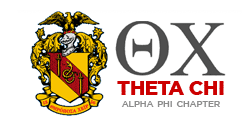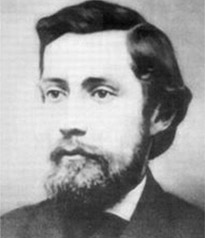 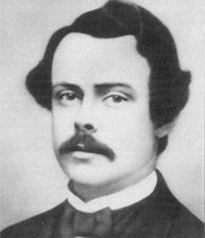 A strong brotherhood since 1856.Theta Chi Society, as it was originally known, was founded on Thursday, April 10, 1856, at 9:00 pm on the campus of Norwich University in Norwich, Vermont by Frederick Norton Freeman and Arthur Chase. At that time Frederick Norton Freeman '57, and Arthur Chase '56, met in Freeman's room in the Old South Barracks of the University and, to quote from the minutes of the first meeting, "being called to order by Mr. Chase, Messrs. Chase and Freeman mutually took the oaths prescribed and declared each other true and accepted members of the Theta Chi Society." From this humble beginning, Theta Chi Fraternity has grown to its present status. To quote again from the minutes of the first meeting we learn that, "The Theta Chi Society was the idea and plan of Frederick Norton Freeman, and with the assistance of Arthur Chase, his plans were perfected and the society was organized." Chase was elected president and Freeman was elected secretary. The next evening, April 11, the first initiation was conducted. One of the initiates was Edward Bancroft Williston of Norwich Vermont, and the other was Lorenzo Potter of Elkhorn, Wisconsin. Theta Chi was the first Greek Letter society to make its appearance at Norwich. It was preceded in 1853 by a secret society known as the "Regulators." In a letter from Arthur Chase sent to the chapter in the 1880's Chase states that he and Freeman were members of a "secret society" prior to founding Theta Chi. However, whether there was any connection between the Regulators and Theta Chi is open to conjecture. The fundamentals of Theta Chi, as expressed in the original constitution, to this day remain unchanged; strengthening the bonds of true friendship, loyalty to Alma Mater, and the mutual benefit and improvement of its members. Our present ritual includes the original ritual used in 1856. The oaths taken by Freeman and Chase on that April evening long ago have since been shared by every man initiated into Theta Chi. The early history of Theta Chi Fraternity is closely connected with the history of Norwich University. The University was founded at Norwich, Vermont, in 1819 being then known as The American Literary, Scientific, and Military Academy. It was a pioneer engineering college of the country and has always maintained its military training and traditions. In 1834 the name was changed to Norwich University. In the Spring of 1866, the Norwich University buildings burned. Old South Barracks, where Theta Chi was founded, was completely destroyed. The University moved after the fire to Northfield, Vermont, its present location. At the Seventy-Fifth Anniversary Convention, the Fraternity erected a granite monument with a bronze plaque at Norwich, Vermont, to commemorate the founding of the Fraternity. In the first decade of the Fraternity's existence, a number of serious handicaps were experienced. The Civil War greatly depleted the student body of the University, for Norwich was a military school. After the fire in 1866, there was a doubt for a while as to whether or not the University would continue. The war, the fire, and the uncertainty regarding the continuation of the University seriously lowered the attendance, and the school opened in the Fall of 1866 with only nineteen students. In spite of the low enrollment, which continued for some years, "The History of Norwich University" by Dodge and Ellis says that "The Theta Chi and Alpha Sigma Pi fraternities flourished in this period, 1866 to 1880. Our FoundersFrederick Norton FreemanThe founder of Theta Chi Fraternity, Frederick Norton Freeman, was born in Claremont, New Hampshire, on March 2, 1839. His ancestors on his father's side had been in America since the early sixteen hundreds. The grandmother of Freeman was a Chase, and through this circumstance, Freeman and Arthur Chase were distant cousins. Freeman attended Claremont Academy and entered Norwich University at the age of fourteen. he received the degrees of B.S. in 1856 and B.A. in 1857 and A.M. in 1860. In the years of 1858 and 1859, Freeman read law in his father's office in Claremont, New Hampshire, and was admitted to the bar, but did not practice. In 1864 Freeman became the first superintendent of the Pennsylvania Coal Company at Newburgh, New York. While engaged in the construction of a new dock for his company at Newburgh, Freeman contracted a severe cold which progressed rapidly to pneumonia. He died suddenly on March 28, 1867, at the age of 28 years. Freeman was a young man of great promise and achievement, who held positions of responsibility and trust far beyond his years. It was unfortunate that his span of life was so short.
Arthur Chase
Arthur Chase was born at Bellows Falls, Vermont, on October 21, 1835. His father was an Episcopal minister who later became the first Bishop of New Hampshire. When Arthur was nine years old the family moved to Claremont, New Hampshire, and this town remained his home for the balance of his life. Chase entered Norwich University in the fall of 1852, shortly before he became seventeen years old. He was graduated in 1856 and immediately entered a law office in Claremont to begin the study of law. He followed this study by attending the Harvard Law School from which he graduated in 1857 with the degree of LL.B. He practiced law in Claremont for nine years and then entered newspaper work, purchasing The National Eagle, a weekly newspaper published in Claremont, in 1868. Chase was married in 1863 to Garafelia Davis. Seven children were born of the union, four of whom, two sons and two daughters, reached adult life and survived their father. After three years of newspaper work, Chase's health failed, and on the advice of his physician he retired to a farm, he purchased on the outskirts of Claremont. Arthur Chase was always a power in his community. At one time he was superintendent of public schools and filled the position with considerable efficiency. He was a staunch Episcopalian and active in church and diocese affairs until the time of his death. Although Arthur Chase never enjoyed robust health, death came unexpectedly and suddenly on November 20, 1888. Chase was 53 years of age at his death, living scarcely beyond middle life. It was said that he lived more in fifty years than most men do in three-score and ten. On-Campus at UA since 1926In 1922, eight men formed an organization known as the Gamma Sigma local fraternity (G stood for "gentlemen", S stood for "scholars"). The group was also known as The Cupids-the fore-runners to our modern Alpha Phi chapter at the University of Alabama. 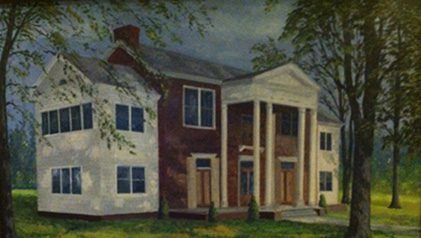 1926-1961: The first Theta Chi Fraternity Chapter House faced the quad and was located on the site of the current ROTC building. In February of 1926, a petition for charter was tendered to the Grand Chapter of Theta Chi. The petition was subsequently granted and Gamma Sigma was made Alpha Phi Chapter of Theta Chi on May 7, 1926. The installation ceremonies began Friday, May 7th, and ended the following evening with a formal banquet at the Hotel McLester in Tuscaloosa; immediately followed by a dance at the Tuscaloosa Country Club. From 1922 to 1925 The Cupids were housed in a three-story colonial home near the campus. In 1926, with its newly-granted charter, Alpha Phi moved to a new home on campus (located on the Quad) which had been built especially for the organization by the University. However, due to the University's need to expand, in 1961 the Alpha Phi house (located on the Quad) was demolished and a new home was built at 501 Jefferson Avenue. This location serves as the current Chapter House for Theta Chi at Alabama.
In 1969, Dale Taylor petitioned for the Ladue Fund (Emergency Fund established in 1950). The Fund is administered by the Grand Chapter for emergency use. Dale Taylor later won the Colley Award, the highest honor bestowed to a Theta Chi Brother. Currently, Brother Taylor serves as the National Director of Theta Chi. In 1971, Harry B. Lackey co-signed for a $25,000 note to expand the Chapter House. With this gracious gesture, Alpha Phi constructed its New Wing ("The Lackey Wing") in 1971.
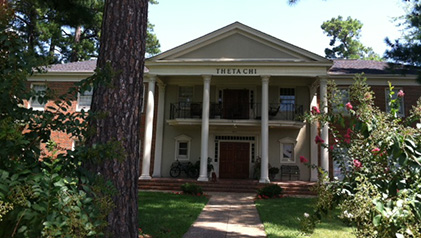 1961-2014: The second chapter house was built in 1961 and is located on Jefferson Ave. It was sold to Phi Sigma Kappa Fraternity. Alpha Phi AccomplishmentsOur brothers are talented. Each year, the National Chapter recognizes outstanding chapters with the Alter Award & the Colley Award. These are the highest honors bestowed upon a chapter and brother, respectively. With great pride, Alpha Phi men continue to be recognized for improving the lives of its members and the university community as a whole.
SGA Presidents
1948 Roy Killingsworth
1973 Larry Childs
IFC President 1971 Marvin McConaghy
2024 Eli Pilger Colley Award RecipientsThe Reginald E.F. Colley Award is a national award of Theta Chi Fraternity that recognizes the most outstanding undergraduate member of the fraternity on an annual basis. Seven Alpha Phi brothers have been recognized as Colley Award recipients: 1963 Dr. Richard A.Thigpen 1969 Dale Taylor 1973 Marvin McConaghy 1975 Peter N. Derzis 1992 Thomas Howard 2005 Lucas Elgie 2015 Marcus Gibson The Howard R. Alter Award for Chapter ExcellenceFormer Fieldmen who served under longtime Executive Director Howard R. Alter, Jr., inaugurated the Howard R. Alter Award for Chapter Excellence upon the occasion of his retirement. The award recognizes up to ten percent of Theta Chi’s chapters for overall excellence. Alpha Phi received recognition in the inaugural year of the award, and the chapter has received it seven times since 1986. 1986, 1989, 1992, 2004, 2005, 2006, 2007, 2008 National Fraternity Involvement and Offices HeldA number of Alpha Phi Alumni have served the National Fraternity as Field Representatives, aka-Field Secretaries and Leadership & Education Consultants. They include: Jimmy Wall ’51, Marvin McConaghy ’72, Pete Mackey ’78, Wesley Wicker ’79, and Lucas Elgie ’05 Alpha Phi’s National OfficersA number of Alpha Phi Alumni have served Theta Chi fraternity as National Officers. Listed below are the years of service on each of the National Fraternity boards, and the highest office obtained during their term:
|
